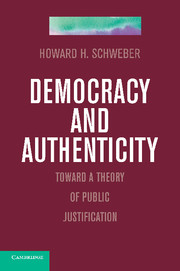Book contents
- Frontmatter
- Contents
- 1 Introduction
- Part One The Case for Constraint
- Part Two Responding to the Case for Inclusion
- 7 Arguments from Consequences
- 8 Further Arguments from Consequences
- 9 Fairness as Equality
- 10 Fairness as Recognition
- 11 The Argument from Epistemology
- 12 Empiricism and Public Justification
- 13 Toward a Theory of Public Justification
- Bibliography
- Index
- References
13 - Toward a Theory of Public Justification
from Part Two - Responding to the Case for Inclusion
Published online by Cambridge University Press: 05 November 2011
- Frontmatter
- Contents
- 1 Introduction
- Part One The Case for Constraint
- Part Two Responding to the Case for Inclusion
- 7 Arguments from Consequences
- 8 Further Arguments from Consequences
- 9 Fairness as Equality
- 10 Fairness as Recognition
- 11 The Argument from Epistemology
- 12 Empiricism and Public Justification
- 13 Toward a Theory of Public Justification
- Bibliography
- Index
- References
Summary
This is a book about liberalism and tribalism. My project throughout has been to explore the implications of a commitment to consensus liberalism and to argue for the necessity of ridding ourselves of the inherited habits of tribalism. The modern version of tribalism is different from its earlier antecedents. Modern tribalism is not expressed in divine commandments to “kill everything that breathes.” It appears, instead, in the politics of authenticity that relies on inaccessibly subjective truth claims and performative identity claims that push dialogue toward a bare maneuver for dominance. In modern democracies, tribalism is not dictated by authoritarian leaders, it is rooted in the claims of populist democracy. Examples of the phenomenon can be seen almost anywhere: in Pakistan in the 1980s, a government seeking to shore up nationalist sentiment enacts a law making blasphemy a capital crime; in 2011, the prime minister of Israel proposes that the oath of citizenship be modified so that henceforth new citizens will declare their allegiance to “the nation-state of the Jewish people” rather than to the State of Israel; in the United States, a president faces accusations of secretly being a non-Christian, and to the surprise of almost no one, acceptance of that claim directly correlates with approval or disapproval of his policies.
Few of the writers whose ideas I have engaged in this book would support any of these ways of thinking, but in a number of cases their arguments provide such tribal appeals entry into the political discourse of liberal democracy. In other instances, writers avoid such dangers only by turning the defining commitments of liberalism away from any program that can plausibly claim widespread support in favor of a comprehensive, perfectionist theory of the virtues of citizenship. The theory of public justification is intended as a corrective to prior theories of public reason and to liberalism's responses to the challenge of pluralism in general. The theory that is developed in these pages seeks standards of accessibility that avoid subjectivism and perfectionism and offers a liberal conception of the political unencumbered by the politics of authenticity.
- Type
- Chapter
- Information
- Democracy and AuthenticityToward a Theory of Public Justification, pp. 391 - 416Publisher: Cambridge University PressPrint publication year: 2011



